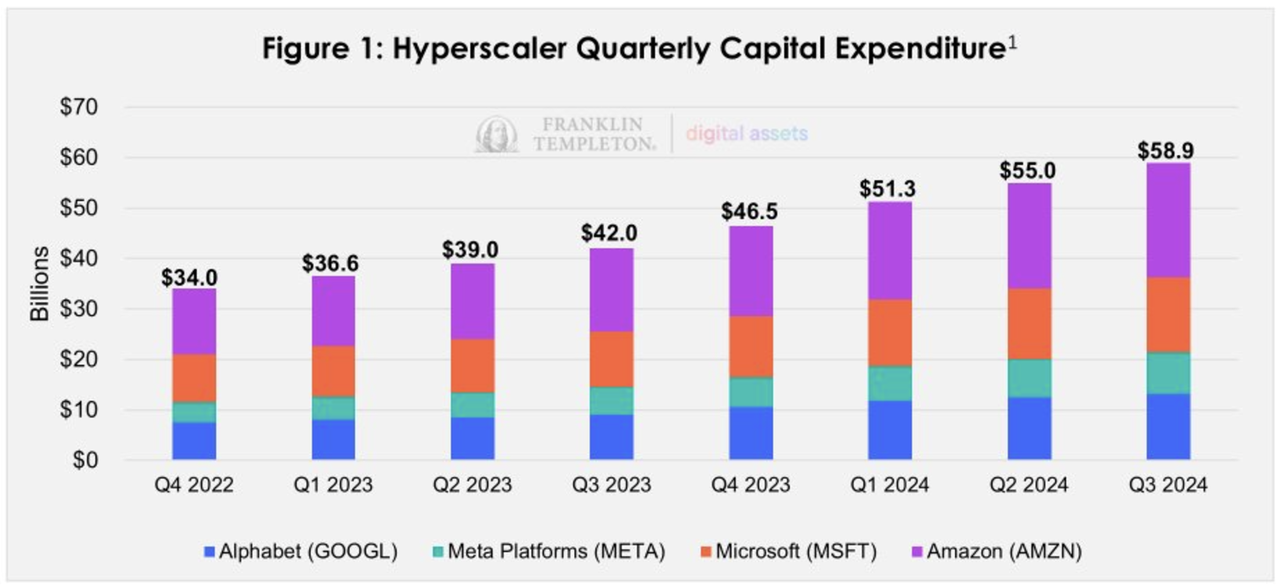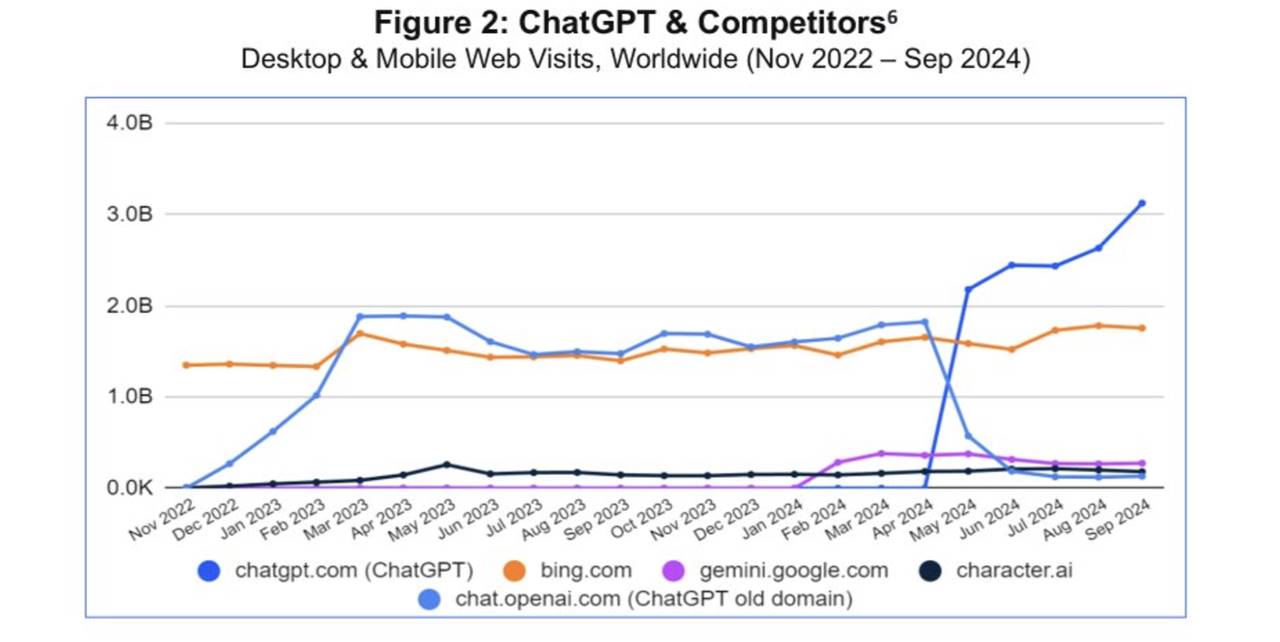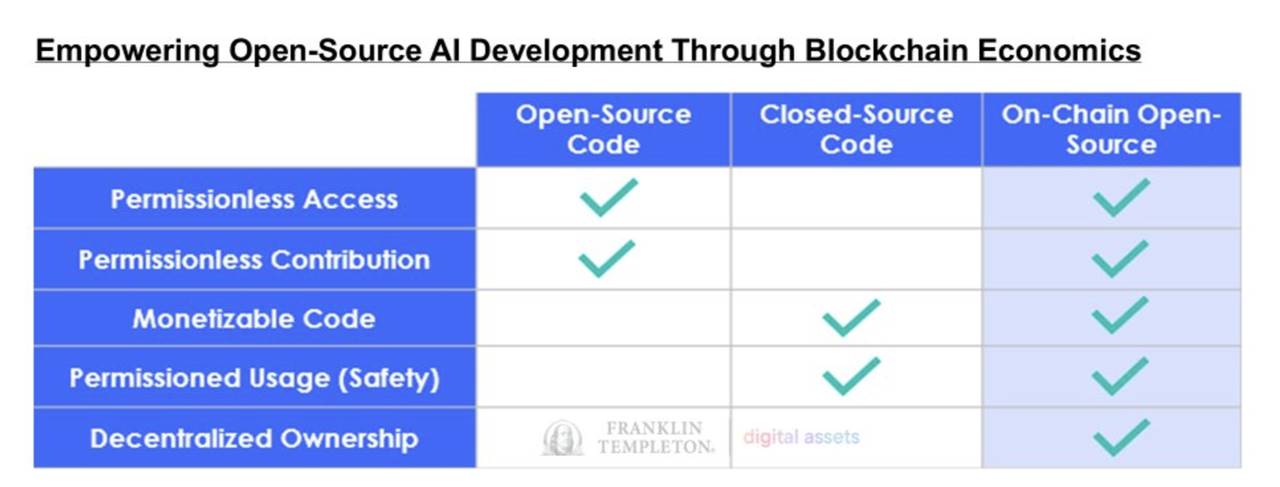Written by: Franklin Templeton Digital Assets
Compiled by: Alex Liu, Foresight News

Artificial Intelligence (AI) will reshape the internet experience and the broader economy. The foundational AI models driving this revolution may be closed-source and owned by a few entities; or they may be open-source and owned by thousands or millions. Which choice ultimately prevails will have significant implications for how value is created and distributed in the AI-driven global economy.
Centralized vs. Decentralized AI Infrastructure
Due to the high cost of training base models, the current AI landscape is dominated by a few major players. Hyperscale enterprises - companies that operate large data centers and can rapidly scale infrastructure - are leading this trend. These companies, including Alphabet, Meta, Microsoft, and Amazon (the top tech companies by market cap), are spending billions of dollars each quarter to establish and maintain their leadership in this field (as shown in Figure 1). This level of investment by a few players creates extremely high barriers to entry, which may lead to monopolistic pricing power, lack of transparency, and biased outputs.

In contrast, decentralized ownership and governance provide solutions to these issues. Utilizing crowd-sourced computing, decentralized AI enables different developers and owners to train models, fostering an inclusive ecosystem with more equitable value capture. This approach can mitigate monopolistic tendencies, promote competitive innovation, and lower barriers to entry. Open-source models further enhance transparency, helping consumers understand the logic of AI and build trust, as well as enabling regulatory oversight.
Case Study of Centralized AI: OpenAI
Top-tier large-scale companies have become the most important competitors in the AI arms race, with OpenAI being a leading player in this contest. This case study examines OpenAI's journey as a pioneer in the AI industry and discusses the ethical dilemmas associated with its growing influence and market dominance.
As the developer of ChatGPT, OpenAI has established a significant lead in this emerging field. Notably, ChatGPT reached the milestone of 1 million users in just five days after its launch. By November 2024, the platform's weekly active user count had more than doubled to over 200 million from November 2023. In October 2024, ChatGPT attracted over 3.7 billion visits, far exceeding the total of all other competitors. OpenAI is projected to generate $3.7 billion in revenue in 2024 and $11.6 billion in 2025. These figures not only highlight ChatGPT's rapid growth but also the widening gap between OpenAI and its competitors (as shown in Figure 2).

OpenAI was initially founded in 2015 as a non-profit AI research organization, committed to an open-source approach and promising to provide its research, code, and data for free. However, in 2019, OpenAI shifted to a "profit cap" model. In June 2020, OpenAI released GPT-3 as a closed-source model (GPT-3.5 and higher versions are also closed-source). In September 2024, there were reports that OpenAI would no longer be overseen by a non-profit board, as it seeks to transform into a traditional for-profit company. Critics have highlighted that OpenAI is deviating from its founding mission of developing safe and general artificial intelligence for the benefit of humanity, as well as its initial emphasis on transparency and preventing concentration of power.
OpenAI's choice to go closed-source has been emulated by other leading base models, including Google Gemini, Claude AI, and Perplexity, with only Meta's LLaMa providing an open-source alternative.
While the shift to closed systems was initially driven by concerns over misuse and safety, it has also raised significant ethical questions about accessibility, transparency, and the broader implications of closed-source models controlled by a few centralized entities driving the internet.
Empowering Open-Source AI Development through Blockchain Economics

The early dominance of leading companies like OpenAI, Microsoft, Alphabet, and Amazon in the development of AI base models is concentrating the control and economic benefits of the most transformative technologies in a few organizations. By adding an economic layer to open-source AI code using blockchain technology, developers around the world can compete on a more level playing field. This novel approach enables open-source contributors to monetize their models, data, and innovations - for the first time combining the collaborative advantages of open-source development with the monetization and security benefits typically associated with closed-source code.
In addition to facilitating the monetization of open-source code, decentralized blockchain-based protocols also allow individual developers and small organizations to crowd-source critical data and computing resources. Without these resources, many developers would be blocked from even starting their efforts. However, if developers from around the world can access the necessary data and computing resources, they will undoubtedly create innovations that complement the work of the hyperscale enterprises.
Overall, blockchain-based AI development coordination protocols empower developers to benefit from open collaboration and resource sharing, while enjoying the ability to monetize their contributions, and ensuring the security and integrity of their work through cryptographic security. Individual developers and small organizations can meaningfully participate in the advancement of AI, gain economic incentives and retain ownership, and ultimately become key stakeholders in the AI internet.
Conclusion
By unlocking the potential of millions of people to contribute to AI in an open and economically viable way, blockchain-supported platforms have the potential to shape the generation and distribution of value in the emerging AI-native internet. Beyond facilitating collaboration, monetization, and the sharing of critical data and computing resources, these protocols also support community governance to ensure collective decision-making on AI development, usage, and safety. This paradigm shift could lead to a more diverse, equitable, and innovative economy.








